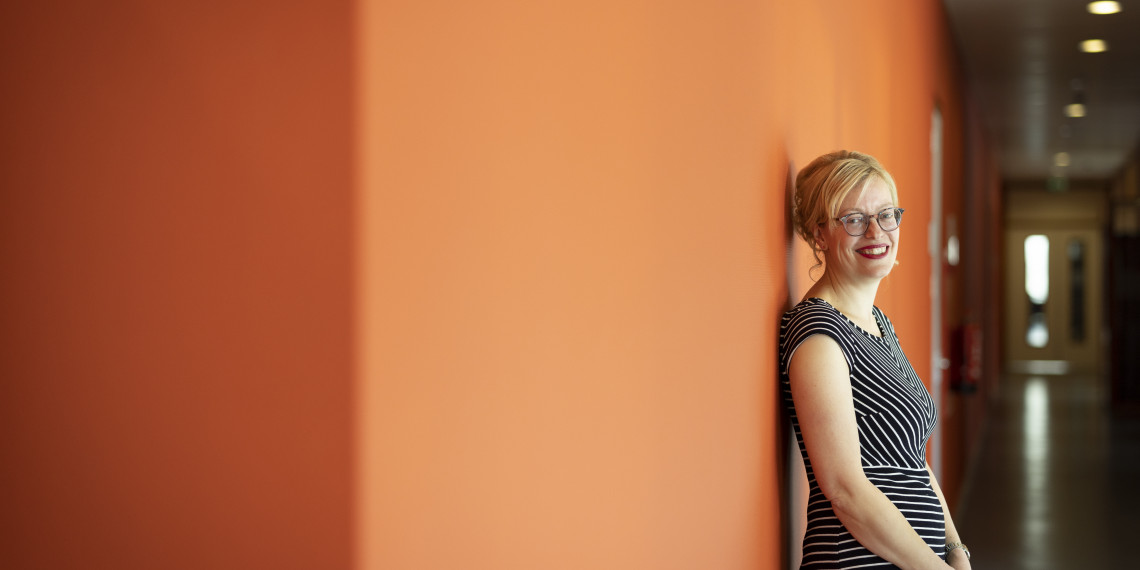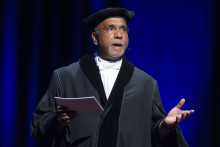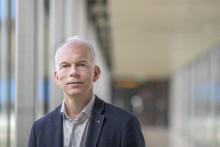Kim Schildkamp was once a curious and even perhaps an overly ambitious primary school pupil. ‘When I got my reports back from school, I was only ever satisfied with a positive review for every topic. The only exception was writing; I knew that was a bit of a lost cause. I have always had a doctor's handwriting. And a doctor is what I became, although not a medical one, haha. I was always referred to as the family professor. I love the fact that I can now see the same type of curiosity in our four-year old son, Dylan.’
She has officially been a professor since last year, with her own chair in Data-Informed Decision Making for Learning and Development. Nevertheless, studying was never the obvious choice for the now professor Schildkamp. Her parents were not poor, but not rich either when she was growing up. ‘And borrowing money was not something you did. I grew up with the idea that you only spent the money you had already earned.’ Thanks to a resolute dean at Twickel College in her place of birth, Hengelo, the mental support she received from her parents, a part-time job at HEMA, and an additional scholarship, Schildkamp was able to study at university.
Adventure
After having some doubts over whether to study educational science with a focus on pedagogy and learning difficulties or educational science in general at either Utrecht or Nijmegen, she ultimately chose to study the latter in Nijmegen. As she worked on her studies, Schildkamp’s lust for adventure began to beckon. She thus ended up at the University of Toronto for her final-year thesis examining the problem-solving capacity of school leaders. It was an adventure from day one. ‘The aircraft landed in the winter when they had had the highest snowfall for fifty years. The first couple of weeks I was living in an apartment that was an hour and a half away from the university. As a young twenty-year-old, I hadn't really thought it through. But, in that period, I discovered that I really enjoyed and wanted to focus on research.’
In fact, she wanted to start working for a research agency as soon as she finished studying. ‘But their message was loud and clear: only come back once you have a PhD,’ says Schildkamp. She then found a doctoral subject at UT that felt as if it was made for her, with the former department ‘Educational Organisation and Management’. And what’s more, while she was in Toronto, she got to know Lorna Earl, first as a mentor and later a friend for life. ‘When I achieved my PhD, she immediately took me under her wing. Then, one day, she said to me, "We’re going to write a book with someone from New Zealand". So we wrote a book together. She also encouraged me to draft a plan for a mentorship award for the biggest educational research conference in the world. And it was a success! She was also one of the people who encouraged me to put myself forward as a candidate in the election for president of the ICSEI, the International Congress for School Effectiveness and Improvement, which I went on to win!’
'I drove around the whole state visiting different schools, passing a few crocodiles along the road'
Crocodiles along the road
After graduating in Canada, the travel bug had certainly not gone away. Schildkamp had wanted to go abroad during her PhD too. Adrie Visscher – now a professor at the department for teacher development, then her supervisor, encouraged her to apply for the prestigious Fulbright scholarship, which she was also awarded. ‘I had no idea that the scholarship was this prestigious; I just wanted to gain more experience abroad. But various people told me that the scholarship would open doors for me.' So, she went to Louisiana State University in Baton Rouge. While there, she noticed that some doors were thrown open to her while others remained firmly shut. ‘My housemates only spoke Cajun and refused to speak to me in English. And, at the university, there were plenty of sociable people but they all worked with their doors closed. Luckily, I found a lovely, close group of like-minded individuals via a meeting for international students. But the research stalled; in order to gather data, I first had to seek permission from the state of Louisiana. This was only granted on the second attempt, when I mentioned that I had a Fulbright scholarship. Then, suddenly, I was able to collect the data I needed for my research, and I drove around the whole state visiting different schools, passing a few crocodiles along the road.'
But the high point of it all was a visit to the University of West Alabama, where they invited her to give a lecture. ‘I felt like a celebrity. I was collected by a private chauffeur, who was quite the character, and, upon arrival at the university, I was given various gifts and noticed the bright neon letters which said: "We welcome Fulbright scholar Kim Schildkamp". It felt very strange! I was supposed to give a lecture to the entire university. But, because of the imminent arrival of a storm, the lecture was cancelled. However, someone from the university invited me to stay with her and on the day of the lecture, she invited other colleagues to her home too. In the end, I gave my lecture in a living room that was bursting with people, while sitting on the ground, with a glass of wine in my hand.’

Research and development together
After obtaining her PhD, and once back in Twente, the UT gave her the opportunity to determine her own research, as a postdoc. ‘It’s a dream of every academic,’ says Schildkamp. Although she started out researching leadership in education, as she completed the doctoral route, she became increasingly interested in the use of data in the education sector. During her postdoc in 2007, she laid the foundations for the data team intervention which focusses on supporting schools in using the information that is available in schools to improve education. ‘Although nowadays we are already examining how artificial intelligence can help in the collection and analysis of data, back then the use of data was in its infancy. There was little understanding of the types of data available in schools, let alone how they could be used.’
'I am not someone who hides away behind a screen in an office. I want to be out there'
In 2009, when Schildkamp was an assistant professor, she came into contact with the Stichting Carmel College. Five schools from this school board began working with data teams. In 2022, this intervention has been applied in five countries, from Sweden to the United States. The reason for its success? ‘The wind was blowing in the right direction for us, as data use in schools was just emerging. But what helped was the fact that we developed the intervention in collaboration with schools,’ explains Schildkamp. This statement immediately goes back to her raison d’être as an academic; the connection with the practical application. ‘This has been the underlying principle throughout my entire career. I am not someone who hides away behind a screen in an office. I want to be out there, conducting research into the reality of how education manifests and develops. That is why it is also great that the UT offers teacher-training programmes. I really enjoy carrying out research and development in co-creation with practice. That is how you find the best solutions for improving education and, in the end, that what it’s all about.’
It helps that networking seems to come naturally to Schildkamp. ‘My friends always say I can talk non-stop. That’s one way of putting it, ha ha, but it’s just part of who I am. There are academics who prefer to retire to their hotel rooms after a conference, but I love to seek out the receptions and talk to people. Everyone can learn how to network. But it's whether you enjoy it or not that makes a difference. I think my approach has opened doors for me that might otherwise have stayed closed. I have been able to create an extensive network and, along the way, build new friendships too.’
Goal
She also had a special relationship with late PhD candidate Wilma Kippers. In the summer of 2018, Kippers was involved in a fatal accident on the Greek island of Santorini. Ultimately, Schildkamp and her colleagues Cindy Poortman and Adrie Visscher defended the doctoral thesis for the PhD candidate a few months later. ‘It was incredibly hard. We were always a very close team; we had been to her house on the farm once and, to the great amusement of her father, had been allowed to ride on the tractor. It is a bitter-sweet fact that she still lives on in her academic work. A while ago, we even published another article written by her.'
Academia never stands still. As for Schildkamp, she still enjoys working at the UT, where she conducts research into data use in various contexts, from within the EU through America, to New Zealand. In the meantime, she has not only become a professor, but also leads one of the zones in the national ‘Acceleration plan educational innovation with ICT’. Some of the expertise gained as a result has been applied in the UT context, especially now that education has become increasingly digitalised as a result of Covid. Together with CODE professor, Bernard Veldkamp, she has also created a new UT network on AI and data in in education (AID-E), under the flag of the Digital Society Institute. This unites all UT employees who are interested in this topic in the context of research, education and policy. Schildkamp’s main aim remains to support educational organization in using data for the purposes of improving education. The most important lesson that she can offer? ‘You don't start with the data – you start with a goal. Otherwise, you will end up drowning in data. We are currently examining, for example, the use of artificial intelligence and how to enhance data literacy in order to improve education. However, the starting point has not really changed since fifteen years ago; first a goal, then the data.’







